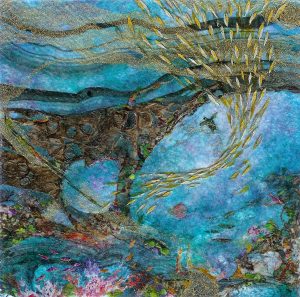 The Yogabliss, Two Rivers/RiverTree Yoga on-line Moving into Meditation classes met this morning. We explored our inter-breathing with the world. We reflected on all we take in and give out. We considered the many kindnesses of Earth and Sun making our lives possible. We are a constellation of relationships emerging moment by moment, breath by breath.
The Yogabliss, Two Rivers/RiverTree Yoga on-line Moving into Meditation classes met this morning. We explored our inter-breathing with the world. We reflected on all we take in and give out. We considered the many kindnesses of Earth and Sun making our lives possible. We are a constellation of relationships emerging moment by moment, breath by breath.
We drew inspiration from poet Arnoldo Garcia’s Meditation on the Breath. Arnoldo’s work is inspired by Earth and social justice. You can find more of his beautiful poetry at: La Carpa del FEO: Fandango en East Oakland.
We heard Zen priest and poet Norman Fischer’s teachings on the self, relationship and compassion. You can read more in the Tricycle Magazine article, We Are Our Relationships You can hear Norman’s recent Upaya dharma talk series, When You Greet Me, I Bow. This is also the name of his latest book of on relationships, culture and engagement.
We heard Rosemerry Wahtola Trommer’s poem, Belonging. Rosemerry teaches and performs poetry for addiction recovery programs, hospice and mindfulness retreats. 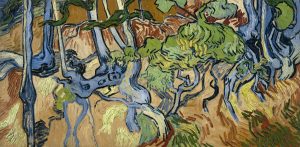 Relaxed Reflection
Relaxed Reflection
Our Bodies are here. We can feel them: those parts touching Earth; those parts held by gravity. Our Breath is here. We feel breathing and embody our relationship with the world. Breathing in, we take in the many kindnesses of Earth and Sun. Breathing out, we give the many kindnesses of being alive. Let your hands rest somewhere on your body to feel warmth, your inner light radiating. Feel breathing filling, lifting and expanding lungs. Draw outside inside; then release inside outside. This is our rhythm with Earth. We are all related.
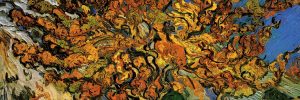 Being and breathing we attune with each other and resonate with the world. We embody all we take in and all we give out. With every breath we are moving energy through the world with air, sensation, emotion and thought. You can place your hands there. Let yourself feel the caring you have for the world. What would you take and give if you could breathe with heart consciousness? We can cultivate love, harmony, wisdom and joy. We can offer acceptance, compassion, loving kindness and understanding.
Being and breathing we attune with each other and resonate with the world. We embody all we take in and all we give out. With every breath we are moving energy through the world with air, sensation, emotion and thought. You can place your hands there. Let yourself feel the caring you have for the world. What would you take and give if you could breathe with heart consciousness? We can cultivate love, harmony, wisdom and joy. We can offer acceptance, compassion, loving kindness and understanding.
We breathe in and out in relation to each other. The quality of our relationships lies in our hearts, our hands, our choices. Here is poet Arnoldo Garcia’s Meditation on Breath:
I breathe in rain
I breathe out green
I breathe in wind
I breathe out sky
I breathe in laughter
I breathe out happiness
I breathe in her
I breathe out poetry
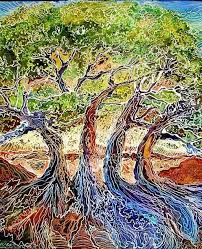 I breathe in daughters and sons
I breathe in daughters and sons
I breathe out hope
I breathe in words
I breathe out mountains
I breathe in sage
I breathe out clarity
I breathe in dust
I breathe out the bones of my people
I breathe in oppression
I breathe out liberation
I breathe in fire
I breathe out clouds
I breathe in ink
I breathe out veins
I breathe in Buddha
I breathe out Mexican.
Breathing in and breathing out we are relating to the human and more than human world. The world of our memory, the world that is here and the world of our future. The quality of relationships lies in our hearts, our hands and our choices. Effortlessly we “participate in the good breathing of the world.” It is our mutual generosity making life possible through our inter-dependence, our inter-being.
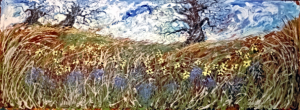 We are intimately a part of the living world around us. In taking in and giving out we stay alive. In taking in and giving out we have to open. In opening we realize our vulnerability. In our vulnerability we feel. We open to the experience of being part of all that is. Thich Nhat Hanh describes this relationship as inter-being. We are inter-breathing with grasses, plants and forests. We can recall all the beings with whom we share inter-being: the familiar and the wild; the oceans, deserts, mountains and ice-lands. We can only flourish together. Zen teacher and poet Norman Fischer believes that we are our relationships. He asks: “Who are you really?” He writes:
We are intimately a part of the living world around us. In taking in and giving out we stay alive. In taking in and giving out we have to open. In opening we realize our vulnerability. In our vulnerability we feel. We open to the experience of being part of all that is. Thich Nhat Hanh describes this relationship as inter-being. We are inter-breathing with grasses, plants and forests. We can recall all the beings with whom we share inter-being: the familiar and the wild; the oceans, deserts, mountains and ice-lands. We can only flourish together. Zen teacher and poet Norman Fischer believes that we are our relationships. He asks: “Who are you really?” He writes:
We’re not anyone in particular. Every moment, in response to the conditions in front of us, another person, the sky, the flowers, we are created again. That’s who we are: our relationship in this moment. Yes, of course, conventionally, we all have identities, commitments, loves, hates, and preferences. . . . But that’s not all of who we are. That’s the point of . . . all spiritual practice: to get in touch with the person that we are beyond the person that we seem to be.
We don’t really ever come to that understanding and realization by ourselves. In Zen practice, it is understood that we enact this wisdom in our connection to one another. It’s our dharma relations, renewed moment by moment as we meet each thing and each person, that bring us to the truth and a kind of awakening within and beyond our suffering.
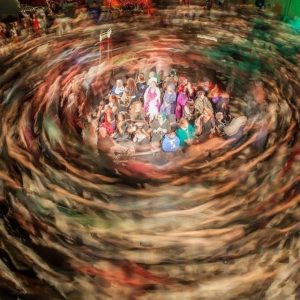 Even though we are practicing at a distance within this cyber space, we are sitting together side by side. We come to our understandings together. Breathing and relating as separate people and as people beyond our separation. Norman explains:
Even though we are practicing at a distance within this cyber space, we are sitting together side by side. We come to our understandings together. Breathing and relating as separate people and as people beyond our separation. Norman explains:
That is why our practice is all about compassion, not only in the sense that I am compassionate for you but also in the sense that I am you. . . . My compassion is me realizing who I am and knowing that having a heart of love for all creatures, all beings, even a blade of grass, is true to who and what I am. . . . That’s why we love one another: because we are one another, and there’s no other way but to love one another. . . .
Poet Rosemerry Trommer explores the wisdom in our connection to one another in her poem Belonging:
And if it’s true we are alone,
we are alone together,
the way blades of grass
are alone, but exist as a field.
Sometimes I feel it,
the green fuse that ignites us,
the wild thrum that unites us,
an inner hum that reminds us
of our shared humanity.
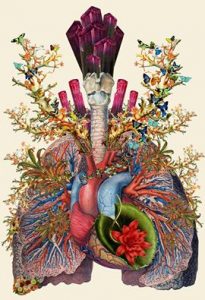 Just as thirty-five trillion
Just as thirty-five trillion
red blood cells join in one body
to become one blood.
Just as one hundred thirty-six thousand
notes make up one symphony.
Alone as we are, our small voices
weave into the one big conversation.
Our actions are essential
to the one infinite story of what it is
to be alive. When we feel alone,
we belong to the grand communion
of those who sometimes feel alone—
we are the dust, the dust that hopes,
a rising of dust, a thrill of dust,
the dust that dances in the light
with all other dust, the dust
that makes the world.
“If we are alone, we are alone together . . . we are the dust . . . the dust that makes this world.”
